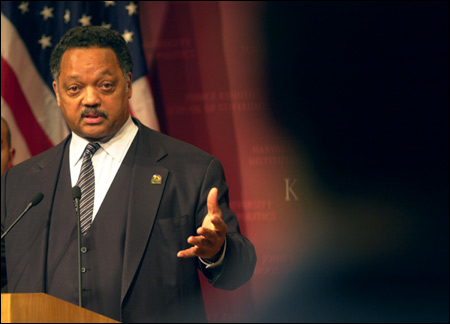Jesse Jackson vows to ‘get out the vote’
Activist says Democratic unity needed to unseat President Bush

The Rev. Jesse Jackson called for a “Freedom Summer” type of effort in the coming months to register voters, heal interracial wounds, and get out the vote for what he said will be a presidential campaign “of historic proportions.”
The civil rights activist and two-time presidential candidate called on Southern voters in particular to turn away from the racial fears and political despair that he said drove them to vote for President George Bush in 2000.
Jackson said Democratic frontrunner John Kerry’s war-hero credentials will make him and his eventual running mate formidable foes for Bush and Vice President Dick Cheney and urged students in the audience to both volunteer and to vote.
“Our vote does matter, and this time it will count,” Jackson said.
Jackson delivered his speech Tuesday (Feb. 17) at the John F. Kennedy Jr. Forum at the John F. Kennedy School of Government. In his half-hour talk, Jackson said his Rainbow/PUSH Coalition is gearing up for an election-season effort in 32 states.
Jackson was on campus to mark the 20th anniversary of the formation of the Rainbow/PUSH Coalition during his first run for president in 1984.
Institute of Politics Director Dan Glickman introduced Jackson, calling Jackson “one of our nation’s most prominent political leaders and social activists.” Jackson was also introduced by IOP Fellow Gary Flowers, Rainbow/PUSH’s vice president of programs and national field director.
Jackson urged people who feel powerless and disenfranchised to join the fight, not to give up. He called for an eco-
nomic revitalization in America coupled with a foreign policy “that is not foreign to our values.”
American foreign policy should seek to lead people based on the best of America, not based on might and intimidation, Jackson said. With increasing globalization and economic interdependence, the United States has to recognize that the people we’re increasingly dependent upon are mostly non-white, non-Christian, and non-English speakers, asserted the former presidential candidate.
“Two-thirds of the Western Hemisphere speaks Spanish. How can you fight for NAFTA one day and ‘English only’ a second day,” Jackson said. “We can lead [the world] by our values, but not rule it by our guns.
“We have globalized capitalism, but not human rights, worker rights, women’s rights, children’s rights, environmental rights.”
With a myopic focus on Iraq and the war on terror, Jackson said the United States isn’t responding to major international crises in Africa, where nations still await funds Bush pledged to fight AIDS, and in Haiti, where violence rages between the government and opponents of President Jean-Bertrand Aristide.
Jackson called for an even playing field for minorities in America, equating the struggle for equality to a football game where blacks need to gain 10 yards for a first down, while whites have to only cover seven yards – because they inherited the other three.
“We do well when the field is even,” Jackson said.
In the South, which went solidly for Bush in the 2000 election, Jackson said whites vote according to racial fears rather than their economic interests. Poor white voters got a marginal tax cut in exchange for their vote, along with policies that drove jobs out of the region.
“They’re working for poverty wages and voting for a tax break for the top 1 percent,” Jackson said. “They got a tax cut, and a job cut, and a benefit cut.”
Black voters, on the other hand, vote their despair, rather than their hope, Jackson said. Eight million eligible black voters aren’t registered, Jackson said, and many who are registered don’t vote.
“We have to build a coalition, a multiracial, multicultural Rainbow coalition. We have to revive hope and urge massive voter registration,” Jackson said. “Where there is hope, flowers blossom.”
In the question-and-answer session that followed his talk, Jackson said he hasn’t endorsed a Democratic candidate for president because he didn’t want to be the target of attack by the others. He also said that though former frontrunner Howard Dean’s campaign is fading, his contribution to the race has been as big as the eventual nominee’s.
Dean, Jackson said, set the pace, identified priorities, and crafted messages that resonated with voters and helped differentiate Democrats from Republicans. Some of those messages have since been adopted by other candidates.
In response to a questioner who was discouraged by the lack of accessibility in the two-party system, Jackson reminded her that change is always difficult, but it also always comes from the people.
“Let me discourage you from being discouraged,” Jackson said. “The change we seek never comes from the top down, it’s always bottom up. No party led the marches on Washington. We the people have the power. When we act, we shape political behavior.”




